
 |
||||||
|
GAY
FILM REVIEWS BY MICHAEL D. KLEMM
|
||||||
|
Love! Valour! Compassion! New Line Home Entertainment, 1997 Director: Screenplay: Starring: Rated R, 110 minutes |
Summertime
Blues
You can find its roots in the plays of Anton Chekhov and trace its lineage from Uncle Vanya (1899) through films as diverse as Jean Renoir's 1939 Rules of the Game, Ingmar Bergman's 1955 Smiles of a Summer Night (and Woody Allen's 1982 homage, A Midsummer Night's Sex Comedy), to John Sayles' 1980 Return Of the Secaucus Seven and Lawrence Kasdan's 1983 The Big Chill. There will always be movies about friends gathering for a weekend in the country and the best of the gay variations on this theme is the film version of Terrence McNally's acclaimed play, Love! Valour! Compassion! |
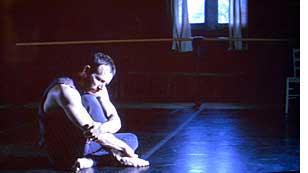 Love!
Valour! Compassion!
opened Off-Broadway at the Manhattan Theatre Club in 1994 before transferring
to Broadway in 1995 and winning the Tony for Best Play. For the 1997 film,
McNally himself adapted the screenplay and the play's director, Joe Mantello,
assembled most of the original cast to reprise their roles. The family reunion
was almost complete but Nathan Lane was
making The Birdcage and so the
important role of Buzz Hauser went to Seinfeld's Jason Alexander.
There will be more about the cast later. Love!
Valour! Compassion!
opened Off-Broadway at the Manhattan Theatre Club in 1994 before transferring
to Broadway in 1995 and winning the Tony for Best Play. For the 1997 film,
McNally himself adapted the screenplay and the play's director, Joe Mantello,
assembled most of the original cast to reprise their roles. The family reunion
was almost complete but Nathan Lane was
making The Birdcage and so the
important role of Buzz Hauser went to Seinfeld's Jason Alexander.
There will be more about the cast later. |
|
|
|
|
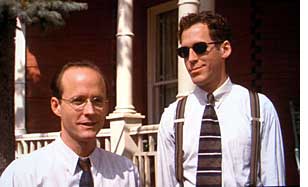 And
now, their guests: Arthur Pape (John Benjamin Hickey) and Perry Sellars
(Stephen Spinella) are gay professionals who have been together for 14 years.
("We're role models," Perry confesses, "It's very stressful.") Buzz Hauser
(Jason Alexander) is Gregory's costume designer. He is the most flamboyant
of the bunch. A fountain of musical theatre trivia, he is the tragic clown
and he is living with AIDS. Gregory's rehearsal pianist, John Jeckyll (John
Glover) is a failed composer and an angry British ex-patriot. John's date
(or trick) is a hot, young, Latino dancer named Ramon Fornos (Randy Becker)
whose flirtatious nature ignites chaos. They will be joined later by John
Jeckyll's twin brother, James (also masterfully played by Glover). James
is a teddy bear compared to his brother, and a shared HIV status brings
him and Buzz together. And
now, their guests: Arthur Pape (John Benjamin Hickey) and Perry Sellars
(Stephen Spinella) are gay professionals who have been together for 14 years.
("We're role models," Perry confesses, "It's very stressful.") Buzz Hauser
(Jason Alexander) is Gregory's costume designer. He is the most flamboyant
of the bunch. A fountain of musical theatre trivia, he is the tragic clown
and he is living with AIDS. Gregory's rehearsal pianist, John Jeckyll (John
Glover) is a failed composer and an angry British ex-patriot. John's date
(or trick) is a hot, young, Latino dancer named Ramon Fornos (Randy Becker)
whose flirtatious nature ignites chaos. They will be joined later by John
Jeckyll's twin brother, James (also masterfully played by Glover). James
is a teddy bear compared to his brother, and a shared HIV status brings
him and Buzz together. |
|
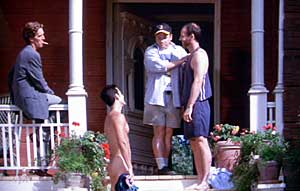 Love!
Valour! Compassion!
is one of those tales where not much happens in the way of action but emerges
as a feast for the emotions. The setting is an idyllic one even if there
is a snake or two in the garden. John is often a pariah (Perry is unable
to stand him) but everyone loves Ramon - or at least drools over him. Ramon's
youth, and his habit of shedding his clothes, is a constant reminder to
the others of their advancing years. Ramon is attracted to Bobby and he
silently sneaks up on him one night, when everyone else is asleep, and seduces
him in the dark kitchen. Love!
Valour! Compassion!
is one of those tales where not much happens in the way of action but emerges
as a feast for the emotions. The setting is an idyllic one even if there
is a snake or two in the garden. John is often a pariah (Perry is unable
to stand him) but everyone loves Ramon - or at least drools over him. Ramon's
youth, and his habit of shedding his clothes, is a constant reminder to
the others of their advancing years. Ramon is attracted to Bobby and he
silently sneaks up on him one night, when everyone else is asleep, and seduces
him in the dark kitchen. |
|
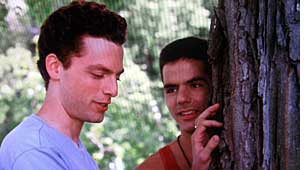 In
other films, this tryst might constitute the main plot but this is an ensemble
comedy-drama in which all of the characters are on a level playing field.
Love! Valour! Compassion! is a tender and lyrical meditation
on the lives and loves of these comrades. It is completely driven by its
fine actors and its exceptional dialogue. Subtle flashes of character co-exist
with the expected bitchy one-liners, and the realism is striking. A fine
sense of humor keeps the film from becoming maudlin. On their 14th anniversary,
Perry begins his declaration of love to Arthur - in front of all their friends
- by saying "I'm married to the best man in the world, even if he doesn't
put the toothpaste cap back on and squeezes the tube in the middle..." In
other films, this tryst might constitute the main plot but this is an ensemble
comedy-drama in which all of the characters are on a level playing field.
Love! Valour! Compassion! is a tender and lyrical meditation
on the lives and loves of these comrades. It is completely driven by its
fine actors and its exceptional dialogue. Subtle flashes of character co-exist
with the expected bitchy one-liners, and the realism is striking. A fine
sense of humor keeps the film from becoming maudlin. On their 14th anniversary,
Perry begins his declaration of love to Arthur - in front of all their friends
- by saying "I'm married to the best man in the world, even if he doesn't
put the toothpaste cap back on and squeezes the tube in the middle..." |
|
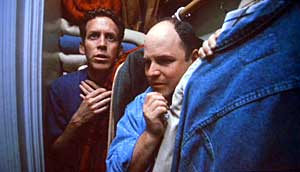 The
film is loaded with such moments. A role-playing interlude between John
and Ramon turns serious when John, lost in a reverie, flashes back to his
teens and remembers Padraic ("the Irish spelling"), who was 17 and his first
sexual encounter. It is an amazing monologue and, before the scene overstays
its welcome, the mood is broken when John discovers Buzz and Perry crouched
in his closet and listening to every word. Arthur confesses that "I'm butch.
One of the lucky ones. I can catch a ball. I genuinely like both my parents.
I hate opera. I don't know why I bother being gay." In act three, when James'
condition worsens, an angry Buzz yells, "I want to see a Sound Of Music
where the entire Von Trapp family dies in an authentic Alpine avalanche." The
film is loaded with such moments. A role-playing interlude between John
and Ramon turns serious when John, lost in a reverie, flashes back to his
teens and remembers Padraic ("the Irish spelling"), who was 17 and his first
sexual encounter. It is an amazing monologue and, before the scene overstays
its welcome, the mood is broken when John discovers Buzz and Perry crouched
in his closet and listening to every word. Arthur confesses that "I'm butch.
One of the lucky ones. I can catch a ball. I genuinely like both my parents.
I hate opera. I don't know why I bother being gay." In act three, when James'
condition worsens, an angry Buzz yells, "I want to see a Sound Of Music
where the entire Von Trapp family dies in an authentic Alpine avalanche."
|
|
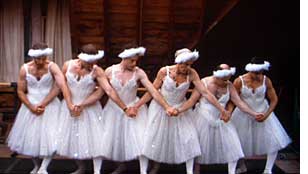 Two
of the film's best scenes, happily, are the two most celebrated moments
from McNally's play. There is a lovely interlude in which Buzz and James
are beginning to fall in love. At Buzz's request, James opens his shirt
to show him his carposi lesion. It is one of the most heartbreaking scenes
in all of queer fiction when Buzz leans forward and touches, and then kisses,
the lesion on James' chest. Later, most of the men will dress in ballet
tutus to rehearse the number from Swan Lake. James joins the dance
but collapses. The rehearsal continues while each of the men delivers a
monologue in which he tells the audience how he will die. Two of the principals
will die from AIDS complications but McNally is also reminding us that death
awaits us all. The seriousness is undercut by the background images of the
men looking both ridiculous and graceful as ballerinas. Two
of the film's best scenes, happily, are the two most celebrated moments
from McNally's play. There is a lovely interlude in which Buzz and James
are beginning to fall in love. At Buzz's request, James opens his shirt
to show him his carposi lesion. It is one of the most heartbreaking scenes
in all of queer fiction when Buzz leans forward and touches, and then kisses,
the lesion on James' chest. Later, most of the men will dress in ballet
tutus to rehearse the number from Swan Lake. James joins the dance
but collapses. The rehearsal continues while each of the men delivers a
monologue in which he tells the audience how he will die. Two of the principals
will die from AIDS complications but McNally is also reminding us that death
awaits us all. The seriousness is undercut by the background images of the
men looking both ridiculous and graceful as ballerinas. |
|
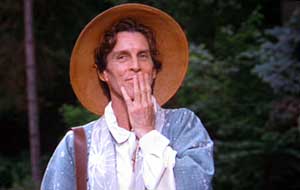 Their
friendships are celebrated but, as you can see, there is also an air of
mortality hanging over this group. A major theme involves people living
with AIDS and the "survivor guilt" of those who escaped the plague. Perry
feels this guilt the most, while Gregory deals with it by planning benefits.
During the interim between the writing of this play, and the making of the
film, great advancements in AIDS medications had been made - prompting some
clueless reviewers to call the movie "dated." I disagree (just as I object
to the charge that Rent is also dated) but I suppose, in some ways,
that Love! Valour! Compassion!
has become a bit of a period piece. Consider, however, the new super-resistant
strains of the virus. Combine this with a general public apathy from those
who weren't out in the 80s, and the film's topic is still worthy of our
consideration and should serve as a wake up call. Their
friendships are celebrated but, as you can see, there is also an air of
mortality hanging over this group. A major theme involves people living
with AIDS and the "survivor guilt" of those who escaped the plague. Perry
feels this guilt the most, while Gregory deals with it by planning benefits.
During the interim between the writing of this play, and the making of the
film, great advancements in AIDS medications had been made - prompting some
clueless reviewers to call the movie "dated." I disagree (just as I object
to the charge that Rent is also dated) but I suppose, in some ways,
that Love! Valour! Compassion!
has become a bit of a period piece. Consider, however, the new super-resistant
strains of the virus. Combine this with a general public apathy from those
who weren't out in the 80s, and the film's topic is still worthy of our
consideration and should serve as a wake up call. |
|
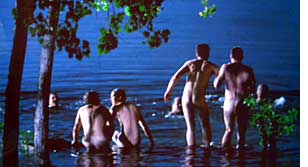 The
play was also noted for its groundbreaking, but not gratuitous, nudity.
The film includes this as well. There's Gregory and Ramon diving nude into
the lake, Ramon sunbathing naked on the raft, and Buzz serving drinks outside
while wearing nothing but an apron. The play's ending is retained as all
the men go skinny dipping in the lake, and this midnight swim evokes the
nude swimmers in the homoerotic paintings of Thomas Eakins. The
play was also noted for its groundbreaking, but not gratuitous, nudity.
The film includes this as well. There's Gregory and Ramon diving nude into
the lake, Ramon sunbathing naked on the raft, and Buzz serving drinks outside
while wearing nothing but an apron. The play's ending is retained as all
the men go skinny dipping in the lake, and this midnight swim evokes the
nude swimmers in the homoerotic paintings of Thomas Eakins. |
|
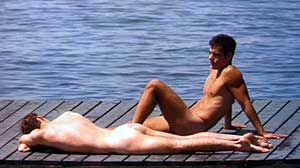 Love!
Valour! Compassion!
has been compared to Mart Crowley's seminal play, The
Boys In the Band (1968 - film, 1970); some mean this as a compliment,
some don't. Aside from both featuring a gathering of eight gay men, the
two have very little in common. Nobody whines and gnashes their teeth over
being gay in the McNally version and the principals don't spend two hours
sniping away at each other. There is a brief moment when the young Ramon
invokes The Boys In The Band by declaring that we don't love each
other because we don't love ourselves and I think this was a deliberate
nod. The big difference between the two shows, however, is the absence of
all that self loathing in Crowley. If any of McNally's characters, like
John Jeckyll, are nasty or unhappy, being gay has nothing to do with it. Love!
Valour! Compassion!
has been compared to Mart Crowley's seminal play, The
Boys In the Band (1968 - film, 1970); some mean this as a compliment,
some don't. Aside from both featuring a gathering of eight gay men, the
two have very little in common. Nobody whines and gnashes their teeth over
being gay in the McNally version and the principals don't spend two hours
sniping away at each other. There is a brief moment when the young Ramon
invokes The Boys In The Band by declaring that we don't love each
other because we don't love ourselves and I think this was a deliberate
nod. The big difference between the two shows, however, is the absence of
all that self loathing in Crowley. If any of McNally's characters, like
John Jeckyll, are nasty or unhappy, being gay has nothing to do with it. |
|
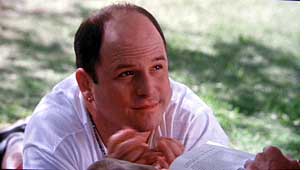 For
reasons that I have never been able to fathom, many modern moviegoers and
reviewers often spew contempt for films adapted from stage plays, even the
ones that are "opened up." Mike
Nichols opened up Who's Afraid of Virginia Woolf? from its single
living room setting to even include a bar down the road and people still
called it stagey. Love! Valour! Compassion!
is a good example of a very theatrical stage play that translated into cinema
quite nicely. On stage, the play ran for close to three hours and the fourth
wall was continually broken as each character spoke directly to the audience,
often with asides that commented on scenes that were still in progress.
These flourishes are eliminated in the film, or re-written as dialogue,
and the adaptation works brilliantly. For
reasons that I have never been able to fathom, many modern moviegoers and
reviewers often spew contempt for films adapted from stage plays, even the
ones that are "opened up." Mike
Nichols opened up Who's Afraid of Virginia Woolf? from its single
living room setting to even include a bar down the road and people still
called it stagey. Love! Valour! Compassion!
is a good example of a very theatrical stage play that translated into cinema
quite nicely. On stage, the play ran for close to three hours and the fourth
wall was continually broken as each character spoke directly to the audience,
often with asides that commented on scenes that were still in progress.
These flourishes are eliminated in the film, or re-written as dialogue,
and the adaptation works brilliantly. |
|
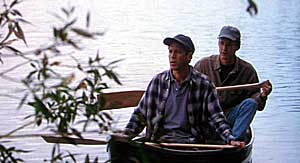 The
cast is excellent. Few film versions of plays retain most of the original
casts and Love! Valour! Compassion!,
like A Streetcar Named Desire, is unique in this regard. I was, at
first, apprehensive of Jason Alexander playing Buzz and - when I saw it
on its first release - it was difficult to get his Seinfeld
character out of my mind. Seeing it again twelve years later has removed
that baggage and Alexander does a very nice and, for the most part, understated
job as Buzz. John Glover is brilliant in the dual roles of the brothers
Jeckyll. Each is a unique character in his own right, and Glover excels
as a prick and as a tragic heroine. Stephen Spinella originated the
role of Prior Walter in Angels In America and Justin Kirk played
Prior in the HBO mini-series of Angels. The
cast is excellent. Few film versions of plays retain most of the original
casts and Love! Valour! Compassion!,
like A Streetcar Named Desire, is unique in this regard. I was, at
first, apprehensive of Jason Alexander playing Buzz and - when I saw it
on its first release - it was difficult to get his Seinfeld
character out of my mind. Seeing it again twelve years later has removed
that baggage and Alexander does a very nice and, for the most part, understated
job as Buzz. John Glover is brilliant in the dual roles of the brothers
Jeckyll. Each is a unique character in his own right, and Glover excels
as a prick and as a tragic heroine. Stephen Spinella originated the
role of Prior Walter in Angels In America and Justin Kirk played
Prior in the HBO mini-series of Angels.
|
|
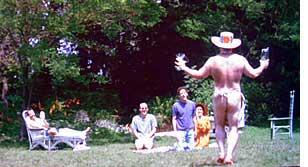 I
have very few complaints with the film rendition of Love!
Valour! Compassion! Some of the music cues are bad, and there
a couple of times when Jason Alexander queens it up a bit too much
as Buzz. Inexplicably, the resolution of Gregory and Ramon's story arc is
missing in the movie. If it was ever filmed, it needs to be included
in a future director's cut or, at least, as a deleted scene on a special
edition DVD. I
have very few complaints with the film rendition of Love!
Valour! Compassion! Some of the music cues are bad, and there
a couple of times when Jason Alexander queens it up a bit too much
as Buzz. Inexplicably, the resolution of Gregory and Ramon's story arc is
missing in the movie. If it was ever filmed, it needs to be included
in a future director's cut or, at least, as a deleted scene on a special
edition DVD. |
|
|
More
on Terrence McNally: Justin Kirk also
appears in: Stephen Spinella
also appears in: Joe Mantella
also appears in: |